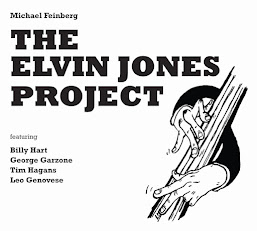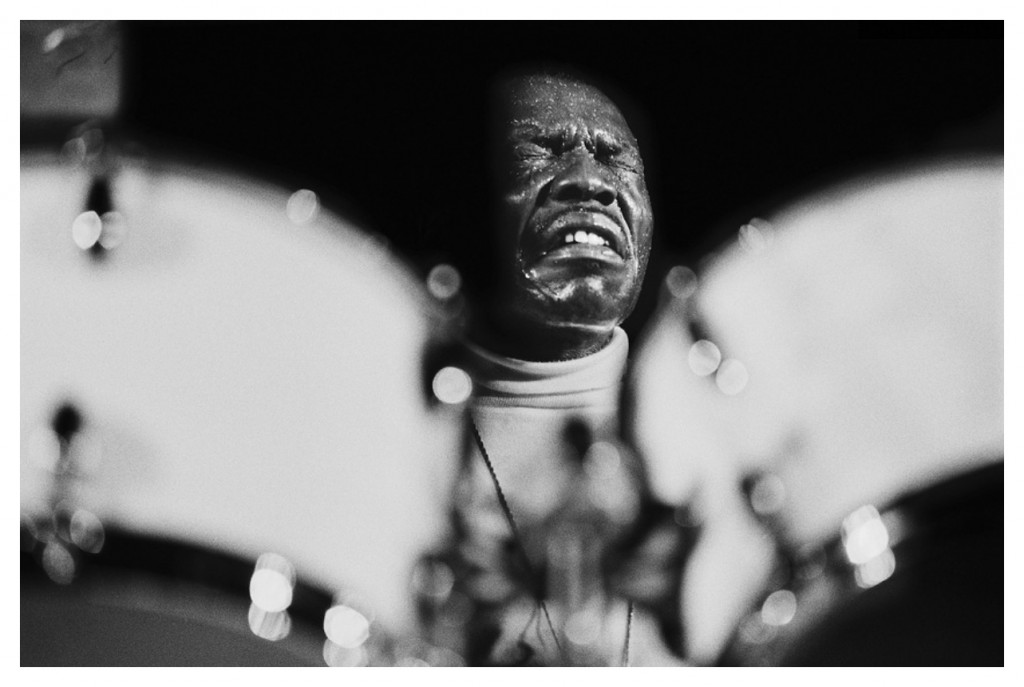Jazz CD Review: A Worthy “Elvin Jones Project”
Bassist Michael Feinberg has done many things right in his richly varied tribute to the great percussionist Elvin Jones.
The Elvin Jones Project by Michael Feinberg. Michael Feinberg, bass; George Garzone, saxophones; Tim Hagans, trumpet; Leo Genovese, keyboards; Alex Wintz, guitar; Billy Hart, drums. Sunnyside Records, $13.25.
By Michael Ullman
Elvin Jones was intense, and not only when he played. I heard him so many times in the 70s and 80s that he began to believe he knew me, and at the Jazz Workshop would sit down and talk. One night he told a story about his older brother, pianist Hank Jones. He said that Hank had a job driving a bus in Pontiac, Michigan where they grew up. Every day Hank had to walk through a white neighborhood, and he kept reporting to his younger brother that someone shot at him repeatedly as he did. Elvin said he was intrigued and went to work with Hank the next day. That day both of them were shot at. Only Jones would have thought it an experience worth seeking out.
Jones learned in the army that it was easy to kill people. He said that night or the next that he was thinking of retiring and raising Brahmin bulls in upstate New York, a strange pipe dream. When the band started playing without him, he moved to the drums, sat still, and listened hard, sweating as profusely as he did when, all four limbs moving seemingly independently, he magically both evaded a constant beat and kept the band swinging.
Jones is,of course, most famous for his six years starting in 1960 with John Coltrane. Nonetheless, he had 12 years of recording behind him, including trio sessions with Sonny Rollins and dates with Miles Davis, Gil Evans, and J. J. Johnson, when he stepped in a studio to make Coltrane’s My Favorite Things. In his long career—he died in 2004—he took part in close to 400 recordings sessions beginning in 1948, when he backed up Detroit tenor saxophonist Billy Mitchell.
Coltrane was his big adventure. Elvin Jones always played precisely, and he always could swing. With Coltrane, he had to devise a way of playing behind Coltrane’s impassive meditations, a way that didn’t suggest a steady pulse that wasn’t meant to be but that added color and impetus to the saxophonist’s stately phrases. On upbeat moments, Jones had a different task, opening up the rhythm. At times Coltrane played a series of clipped, tight phrases that, taken alone, would not be scintillating. He was not alone. That’s the problem with academic transcriptions of Coltrane’s solos: however helpful to other saxophonists, they are misleading as a guide to what Coltrane was dealing with. He’s responding and interacting with the rhythm section, and sometimes in duet, with the endlessly creative drumming of Elvin Jones.
Bassist Michael Feinberg has done many things right in his richly varied tribute to the great percussionist, beginning with his choice of a drummer. Billy Hart is a near contemporary of Jones, and one of the most tasteful, flexible drummers alive. With a group of equally fine players, Feinberg plays six Jones-related pieces, including “Miles Mode” and “Nancy With the Laughing Face,” which Jones related to Coltrane. Two pieces were written by saxophonists with whom Jones played: Frank Foster’s rocking “The Unknighted Nations” and Steve Grossman’s “Taurus People.” Two are by Jones himself, and the last piece, “It is Written,” is Feinberg’s evocation of the sound of the 2001 recording Jones made with guitarist Bill Frisell.
The album begins with Feinberg playing an attractive bass figure over electronic buzzing and the gentle tapping of Hart’s cymbals on the mesmerizing “Earth Jones.” Sometimes joined by Garzone, who has long since shed any obsequious debt to Coltrane, Hagans plays the melody in long tones over the shimmering textures provided by drums and keyboards. Meanwhile Feinberg’s intones the same figure.
There’s no attempt to imitate the sound of the John Coltrane Quartet, certainly not on “Nancy,” which begins with a bowed solo by Feinberg. “The Unknighted Nations” is an equally convincing hard bop number that follows the gently lyrical “It is Written.” There’s variety here, balance, and excitement from a pickup band that sounds together. It’s a tribute album that stands, gloriously, on its own two feet.
Tagged: Alex Wintz, Billy Hart, Elvin Jones, George Garzone, John-Coltrane, Michael Feinberg, Sunnyside Records, The Elvin Jones Project


